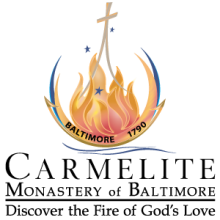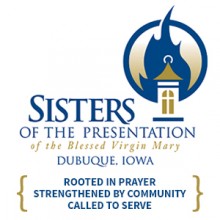
A reluctant church-goer asks why the Catholic Mass implies that God is the writer of the bible when that’s not the case. Hear the full Ask Sister episode AS236 at aNunsLife.org. Hosts: Sister Maxine and Sister Shannon.
Let us know your thoughts about this podcast--please click here to take a short survey. Thank you!
Sister Maxine
This podcast is brought to you by one of our sponsors, the Sisters of the Precious Blood, Dayton, Ohio. Our final question, Shannon, comes in from Johnson, in Michigan.
Sister Shannon
Little closer to home.
Sister Maxine
I know, very close to home. And Johnson writes, "I go to church with my wife, because it makes her happy. I don't complain about it. But sometimes it's frustrating. Like, for example, when they say after the readings, 'The word of God.' I don't know much about the Bible, but I do know that God did not write it. Regular people did. How does a regular person know what God would say? How do we know the Bible writers didn't just make it up? It's not that I disagree with the messages of the Bible. Some of them are very good. But is it actually the word of God or the word of a regular person? Thank you." Well, Johnson, a very interesting question. And I think a lot of people have this kind of a question.
Sister Shannon
It brings to the fore those people who believe so deeply that it is literally the word of God, and sometimes versus those people who recognize that it was inspired by God, but written by regular folk. I think that the piece that I don't hear in your question is the acknowledgement that this is inspired, and that God had an active hand in it. And perhaps you're taking the sense of the phrase, "The word of the Lord" or "The word of God" so literally. Certainly, the church does not teach that God writes it. And we used to believe in a kind of sense of inspiration that we called "mechanical." Picture this image: So Matthew, the Gospel writer, is sitting at the desk with his stylus in hand and the parchment in front of him. And God is literally whispering in his ear to begin the words, and to write them down. What does that make of Matthew? It makes Matthew simply an extension of the pen. He's not the author, he's just simply writing it down. He's taking dictation. For a long time, that was our sort of narrow interpretation of what it meant that this was the inspired Word of God: that literally God wrote it. But over time, we've come to realize that God acts in the lives of people, and that God inspires people to write wonderful and beautiful things. And when those sacred scriptures became for us, as Christian people, literally Sacred Scripture, it was our faith tradition that gave it that honor and acknowledged that these are indeed inspired words, written by human persons, but inspired by God, and the power of the Holy Spirit.
Sister Maxine
When you say written by human persons--these were exceptional writers.
Sister Shannon
Let me give you an example. In the gospels--so we're just talking New Testament right now--three of the Gospels are referred to as the synoptics. Because they're kind of a synopsis of one another. It's Matthew, Mark, and Luke. And over time, scholars have come to realize that the oldest of those documents is the Gospel of Mark. How did they determine that? Well, number one, it's the shortest version. So it would figure that if you were looking at somebody else's copy and writing your own, that you would extend yours and make it longer. Much of the text that appears in Mark is repeated in Matthew and repeated in Luke. But each of them seem to have an additional source beyond the writings of Mark, so that their text gets longer. They make some selection about stories that they include that Mark didn't have in his. And the timing matters--when they wrote it, how soon it was after the events of Jesus's life, or if it was in response to what was going on in the church. So the Gospels of Matthew and Luke, in particular, are a response to the early church community, recalling the events of Jesus's life, but using it as a teaching tool. In fact, Matthew uses the word "church" for the first time in his Gospel, so they were becoming organized. Mark doesn't ever do that. In his early writings, we get a much more human Jesus that's presented in the way that Mark tells the story with lots of emotion and very few details, because he was writing in Greek, and it wasn't his first language. His first language was probably Aramaic, and so he struggled a little bit with it, and you can see that in the writing.
Sister Maxine
It's an interesting comment as you talk about how do you know some of these things, because it sounds like Johnson is approaching this question from the point of view of logic. It is not logical that God would have written this. And what you're describing is, there is logic in it; you've got to have the context. Certainly we learn more and more, as with everything, as the generations go by. But for somebody like Johnson, it might be extremely helpful to do some study, because even as you describe this, you can hear the logic of it; it takes place in a certain time, the word of God comes out of a certain situation in the world and in the church.
Sister Shannon
They're addressing a particular audience. We give it the power of inspiration and revelation, because it's revealed to us what God wants of us. But we recognize that revelation is never fully opened up. It continues to be revealed. So you've heard the same story in the Gospel of Luke, or John or Matthew over and over again. And then suddenly, one day when the priest is talking about it sort of hits you. There's ongoing revelation that's there, and we recognize it as revealed. And that's the piece I think that Johnson is really questioning: who said it was the Word of God? It's our church tradition that has given it that honor, in much the same way that the Jewish scriptures were honored by the Jews in their tradition, we chose to recognize that the Jewish scriptures were the beginning of our own story. We include them in our scriptures, and then we add to it. And we don't know the criteria that those early writers used to determine this book should be included, or that shouldn't, because the Bible is really an anthology of works. It's many, many writings. We have four gospels, not just one. So why is that? And how did they get included? So they've attempted to sort of look back and determine from hindsight, what were the criteria? How were the stories connected with the apostles themselves? Were the stories containing things that were out of character in the culture and society? Jesus said and did some things that nobody would have said and done within the confines of a very strict Jewish tradition. So it must be Jesus that says it, right? Because it's so startling, and mind-grabbing, if you will.
Sister Maxine
Some people would look at that and be like, "Well, you know, how divinely inspired can be? It's inconsistent." What do you do with that question of differences? Sometimes you see kind of an angry Jesus, sometimes you see a different side of Jesus. What should you expect out of that?
Sister Shannon
And the image of God that is in the Old Testament, 1850 BC, is changeable. Throughout the centuries, there was a whole different point and a whole different understanding of who God is. But if you think about the scriptural tradition as a story of faith, then you start to see the impact of the story.
Sister Maxine
And to recognize, as you said, it is the story of the journey of faith. Maybe some of the edginess in Johnson's question is like, it's not meant to be a story that you get hit over the head with to tell you if you're right or you're wrong about something. It's a story to keep you going in your faith.
Sister Shannon
You know, I don't know what Johnson's background is in terms of faith, if he is a Baptist Christian, if he's a Catholic. We don't know his story, because he didn't share that with us. But there was a long period of time before the Second Vatican Council that Catholics were not encouraged to read the scriptures. And there was a sense in which the sacredness of the text was so reserved, we felt that only a learned person who had actually studied could share the faith. But after the Council, things really began to change--even before, quite a bit. I don't want to use that as the only demarcation. But we are encouraged now, as believers, to look into it. And because you choose to go to liturgy with your wife, which is a beautiful, loving act, this may be, for you, the call to look more seriously at what does the Scripture teach us? And if you believe that some of it is good, then maybe you want to read a little bit more, or study as Sister Maxine says.
Sister Maxine
Certainly you make your own decisions about that. But it may also be a way to draw closer to your wife. There's something obviously that is so compelling to her, and she wants to share that with you. I think that's a good thing. To hear full episodes of A Nun's Life podcasts, visit the podcast page at anunslife.org/podcasts.
This transcript has been lightly edited for readability.














